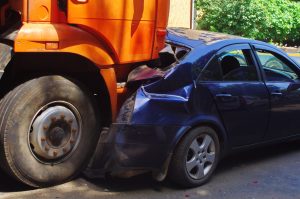After a truck accident, you may wonder if you can personally sue the driver. Whether or not you can sue someone personally depends on the type of insurance coverage you and the other driver hold as well as the severity of your injuries. Sometimes, you may be able to file an insurance claim against someone for damages not covered by your insurance. In other situations, insurance restrictions may prevent you from filing a lawsuit against the negligent party.
Talk to a skilledWashington, DC truck accident lawyer to understand how you can sue someone personally after a truck accident.
Contact Us Today to Schedule
a Free Consultation
A DC truck accident lawyer at Regan Zambri Long can help assess the damages you seek and pursue a fair settlement to help you recover. Call for your free consultation today to determine if you can sue someone personally after a truck accident.
Each state has minimal insurance coverage requirements. Semi-trucks have different requirements due to their size and commercial use compared to personal vehicles. Commercial truck drivers often must carry insurance for their trucks and another form of coverage for themselves.
In comparison, non-commercial drivers must carry no-fault or at-fault insurance as determined by their state. Washington, DC is a no-fault car insurance system.

Further, if you exceed the maximum amount permitted under your policy, you may be able to seek compensation from the at-fault driver.
In at-fault states, drivers must carry liability insurance–this means if one person causes the accident, that person is responsible for all of the damages. Most often, the at-fault driver will be identified and that driver’s insurance company will work towards a settlement. But, if inadequate compensation is given from the insurance, the other party can sue the other driver–in this case, the truck driver–personally.
If you are looking to sue someone following a truck accident, seek an insurance settlement in an at-fault state, or seek damages past the insurance coverage, the first step is to establish liability.
In general, one driver will be primarily responsible for the collision. But, there are multiple factors to consider when it comes to the involvement of large-scale commercial trucks and determining liability.
In at-fault states, the driver who is most responsible for the accident must pay for all of the damages. The trucking company could be held liable as well. In no-fault states, both parties have a percentage of fault which impacts the number of damages paid out.
Generally, insurance companies find it to be the most cost-effective to blame the other driver to avoid the payout, dragging your truck accident case on for months, even years. However, a truck accident lawyer can help.
Sometimes, a driver isn’t the only one to blame. If dangerous roadways were the cause of the truck accident, you may be able to seek damages against the government agency that was in charge of road maintenance.
Though complex, the Federal Tort Claims Act (FTCA) does allow a civilian to pursue a claim against the government. You must be able to prove that you were injured because of the government’s negligence, that the agency was acting within its scope, and that the action was negligent and the negligent act caused the injury.
Though human error is often the cause of serious truck accidents, defective parts do play a role in yearly truck accidents. Drivers involved in an accident because of a faulty part can file a product liability suit against the manufacturer for negligence.
If you sue someone personally after a truck accident, there are various awards you may seek depending on the severity of your injuries, and how much your insurance covers. This includes:
Most personal injury cases, including truck accidents, do not end in a lawsuit. This is because for all parties involved, it is often cheaper and faster to settle outside of court, than to have to go to a truck accident lawsuit.
However, just because you likely won’t have to sue doesn’t mean there are no benefits to doing so.
Potential benefits of filing a truck accident lawsuit include:

Before the truck accident lawsuit, ask yourself and your attorney:
Once you have answered those questions, you can then move on to building your truck accident lawsuit. This includes gathering evidence and conducting the following steps:
If you live in Washington, DC, Maryland, or Virginia, the truck accident attorneys at Regan Zambri Long, can get you the best results possible for your case. For a free, no-obligation consultation, call (202) 960-4746 today.